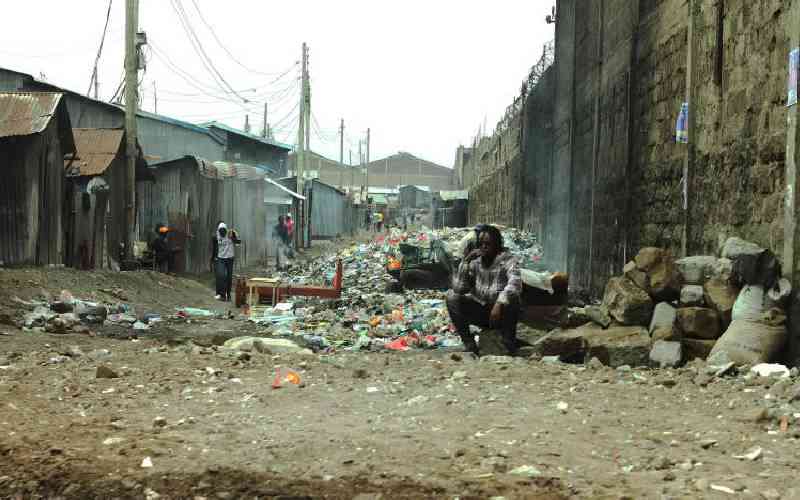By JOHN OYWA
Muthurwa Primary School sits in the heartland of a confused environment.
Surrounded by hundreds of jua kali sheds and located just a stone throw from the infamous Muthurwa market, the noisy Gikomba market and the messy ‘Machakos’ bus terminus, the school appear to be under siege from an overcrowded and unfriendly neighbourhood.
But behind the simple metal gate that shield the school from the outer world, lies an untold story of an institution whose teachers and pupils have beaten the odds and are confronting the future with hope and confidence.
It is perhaps the only slum school where 13-year-olds can successfully conduct a Power Point presentation to assembled guests and confidently use the Internet to aid their studies.
Working from laptops at the school’s library last Friday, pupils Nicholas Gichiria, Arnold Odhiambo and Benjamin Oyuga logged onto the Google and meticulously researched on their pet subjects – recycling of solid waste and Agro forestry.
One hour later, they were on the podium, armed with a projector and a laptop to educate colleagues and assembled guests about their school’s environmental conservation project.
Exchange
Among the audience were three visiting teachers from the Central Foundation Girls’ School in the United Kingdom who were in Muthurwa as part of an exchange programme between the school and their institution.
It is this exchange programme – the Global School Partnerships, funded by the British government, which is changing lives at Muthurwa. Teachers and pupils at the UK school had donated 10 laptops and five desktop computers to the school.
"Things started changing the day ten of our pupils and three teachers visited London for an exchange tour facilitated by the British Council in 2008," says Muthurwa Primary School Head teacher, Ms Jane Mwaura.
She says her school, run by the Nairobi City Council, has never been the same after the UK visit. Three teachers are currently planning a visit to the UK. "Besides a robust computer and environmental management programmes, the exchange project has not only changed the perceptions of the pupils and their teachers but have sucked them into the global village.
They already know how to communicate through e-mails and even read the newspapers through the Internet. "It is amazing. They can send e-mails and even use Skype and the Face book," said Ms Mwaura.
Ms Mwaura says her school’s performance in the KCPE has drastically improved since she entered into the partnership mainly because the teachers had learned more effective teaching techniques while the candidates have gained confidence in tackling exams. "Before the partnership, our school was always at the bottom of the table in KCPE performance in Nairobi District. Last year we were in top ten. We even had a candidate with 390 marks," says Mwaura.
When The Standard visited the school last week, young Maureen Kwendo, 14, was reading an education story on the Standard Online edition. Her deskmate, Felix Okemwa, 13, was reading mail sent by a student friend from London.
Stay informed. Subscribe to our newsletter
"The pupils are from the surrounding slums but they are highly motivated, hopeful and informed because of their interaction with their counterparts from London with whom they share lifetime experiences," says Ms Mwaura.
Through the exchange programme, Muthurwa Primary School has started a lunchtime feeding programme for all the 850 pupils, has a kitchen garden and a roof water-harvesting programme.
The schoolteachers and the pupils have learnt affective and efficient use of resources.
A forestation project idea borrowed from the UK has made the Muthurwa school community plant more than 3,000 trees within the school.
Experience
Last week, the UK teachers were in the school for three days, during which they taught varies subjects and visited homes of some of the pupils at the Muthurwa and Majengo slums. "It was a humbling experience. We learnt many lessons on how the Muthurwa pupils put up brave faces in class despite the fact that they live in deplorable conditions back at home," said Janet Chapman, a veteran teacher from Central Foundation Girls school and the visitors’ Team Leader.
She added: " We were amazed at the high speed in which the pupils learnt the use of computers. Its proof that some of the best brain reside in the slums."
The UK pupils and teachers have been fundraising for their school towards the feeding and Agro forestry programme, meant to fight global warming.
Muthurwa is just but one of the many schools in Kenya, which are today benefiting from the Global Schools Partnerships programme.
The British Council’s Regional Manager for Sub Saharan Africa,Tedman Aloo said that some 100 teachers and pupils from UK schools visited schools in various parts of the country as part of the partnerships.
"The partnerships tackle global issues and help to cement relationship between Kenya and UK. It helps teachers and pupils to learn about fairness and to create a just world around them," said Mr Aloo.
 The Standard Group Plc is a
multi-media organization with investments in media platforms spanning newspaper
print operations, television, radio broadcasting, digital and online services. The
Standard Group is recognized as a leading multi-media house in Kenya with a key
influence in matters of national and international interest.
The Standard Group Plc is a
multi-media organization with investments in media platforms spanning newspaper
print operations, television, radio broadcasting, digital and online services. The
Standard Group is recognized as a leading multi-media house in Kenya with a key
influence in matters of national and international interest.
 The Standard Group Plc is a
multi-media organization with investments in media platforms spanning newspaper
print operations, television, radio broadcasting, digital and online services. The
Standard Group is recognized as a leading multi-media house in Kenya with a key
influence in matters of national and international interest.
The Standard Group Plc is a
multi-media organization with investments in media platforms spanning newspaper
print operations, television, radio broadcasting, digital and online services. The
Standard Group is recognized as a leading multi-media house in Kenya with a key
influence in matters of national and international interest.









